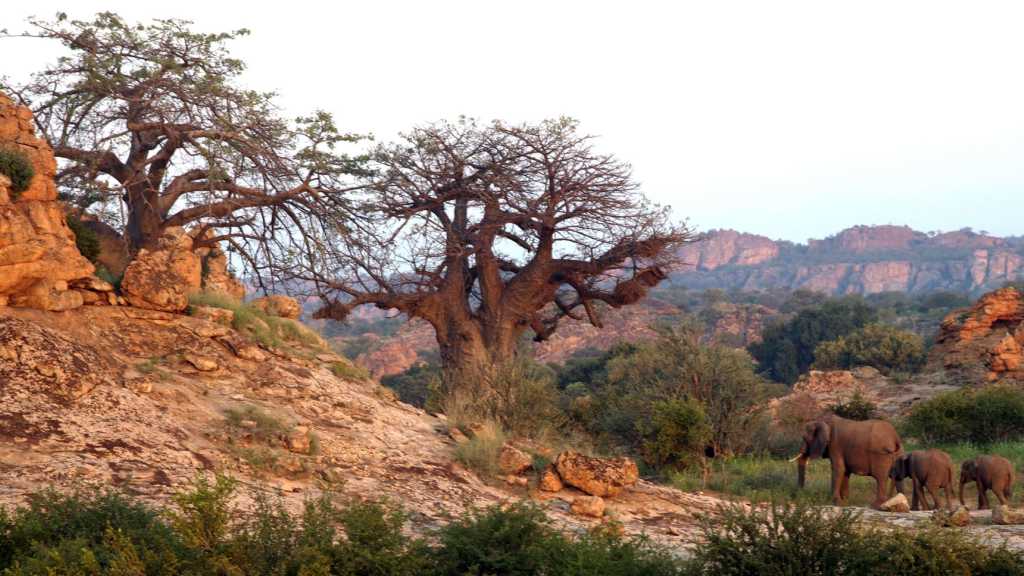Tuli Block has been an integral part of a large cross-border reserve since 2010, shared between Zimbabwe and South Africa.
The huge, non-fenced and wildlife-rich private concessions of the reserve, between the Motloutse, Limpopo and Shashe rivers, were created in the late 1960s by the white farmers of Tuli Block who could no longer properly farm their territory which were constantly invaded by wild animals.
This reserve, of more than 700 km², is very singular in the country. With hills and valleys, it is distinguished indeed by the extreme diversity and the originality of its reliefs. In the vicinity of Mashatu, the piles of sandstone blocks or the orange-pink hills leave their silhouettes on the lush vegetation of the river banks.
Further north, towards Jwala, long belts of mopanes mark the bed of the dried up rivers, while a little farther, at the extreme north, mysterious piles of rocks with the precarious balance come to remember the atypical formations of Matopos (in Zimbabwe) of which they appear the continuation. Archaeological and historical sites have been scattered here and, at the top of the hills: it adds to the charm and mystery of the places. The reserve is divided into several private concessions. It is therefore necessary to stay in a camp or in a lodge in order to visit it.
This South-Eastern area in Botswana, which corresponds to a strip of about 200km at the south-eastern border, is not the most touristic in the country. However, this area concentrates nearly 80% of its population: cities of Gaborone and Francistown are vital economic and administrative poles in the country. However the landscapes are worth seeing: distinguished from Kalahari by a more rugged relief mixing hills and rocky cliffs. The capital Gaborone, then further north the region of Tuli Block, and Francistown and its surroundings are definitely points of interest while visiting the country!
- All of this southeastern part of Botswana is the cradle of the nation and the main Tswana tribes. A very good way to immerse yourself in Botswana's cultures.
- Gaborone does not deserve a visit in itself but can be a nice and cultural stopover from South Africa - Madikwe Game Reserve for example...
- The Tuli Block area combines well with either a stay in North Kruger and Venda area. It can also be a great stop on the road between Johannesburg and the famous Victoria Falls ...
Botswana, the Greatest Wildlife
Botswana's National Parks are, without doubt, the wildest in Africa. Tourism is intentionally limited to preserve pristine nature. If you can afford authentic Africa, head for Botswana, one of the last wild sanctuaries on the continent, distinguished by an abundance of exceptionally rich wildlife. A trip to Botswana almost inevitably involves a visit to Victoria Falls in Zimbabwean territory due to their strategic position: take a step at the end of your safari, their grandiose appearance will amaze you.
When to go?
The dry season lasts from April to October to the south and November to the north where, however, the rain totals are higher. The southern part of the country is most exposed to cold winds during the winter period (early May to late August) when the average temperature is about 14 ° C (57.2 ° F). The whole country has hot summers with average temperatures around 26 ° C (78.8 ° F). Temperatures are high throughout the year although winter is the sunniest period. The whole country is windy and dusty during the dry season.
Formalities
The visa is not compulsory for French nationals. The passport must be valid for at least six months after entry into Botswana. The permitted length of stay is in the sole discretion of the Immigration officer, it is recommended to check the date on the stamp when entering the country.
Anyone traveling to Botswana with a minor child must be able to provide a complete and certified copy of the child's birth certificate or a plurilingual birth certificate in addition to his or her valid passport. If the child is traveling with only one of his parents, he will have to present a travel authorization signed by the absent parent.
Health
No vaccination is mandatory but some vaccinations are recommended; Yellow fever vaccination is mandatory for all travellers from a country where endemic yellow fever is present but may be advised to all travellers.
Antimalarial treatment is recommended (see your doctor).
Currency
The Pula (which in Tswana means "rain") is the official currency of Botswana.
Major credit cards are accepted in most of lodges but it is imperative to possess US dollars in sufficient quantity to regulate the extras (drinks, tips...)
